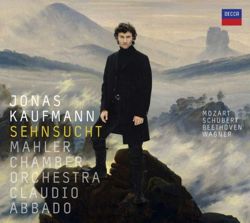|
|
|
|
|
|
|
|
| Opera News, June 2010 |
|
FRED COHN |
|
Jonas Kaufmann |
|
|
 Jonas
Kaufmann's German opera recital is not only a definitive announcement of his
arrival into heldentenor territory: it's a compelling argument for a
revisionist view of musical history. Wagner is the main event, but here his
music bookends arias by Mozart, Beethoven and Schubert. In this context,
Wagner emerges less as the revolutionary of the conventional music-history
narrative than as the standard-bearer for the German Romantic tradition. Jonas
Kaufmann's German opera recital is not only a definitive announcement of his
arrival into heldentenor territory: it's a compelling argument for a
revisionist view of musical history. Wagner is the main event, but here his
music bookends arias by Mozart, Beethoven and Schubert. In this context,
Wagner emerges less as the revolutionary of the conventional music-history
narrative than as the standard-bearer for the German Romantic tradition.
The clarity of this vision is no doubt due to the presence of Claudio Abbado
on the podium. The great conductor emphasizes the element of song that runs
through each of the selections. He draws luminous sounds throughout from the
Mahler Chamber Orchestra. The band is presumably augmented for the Wagner
selections, but still the playing has a chamber-music-like transparency. One
registers no stylistic disunity when, toward the beginning of the disc,
Lohengrin's farewell gives way to Tamino's "Dies bildnis": in these
interpretations, Mozart's Egypt neighbors on Wagner's Brabant.
The inclusion of two Schubert selections provides a key to the interpreters'
approach. An aria from Fierrabras presents the title character in a
declamatory mode like that of Beethoven's Florestan, anticipating the heroic
gestures of Wagner's tenors. The pastoral manner of the composer's lieder
predominates in "Schon, wenn es beginnt zu tagen," from Alfonso und
Estrella; what's extraordinary, in this context, is how easily one can find
a similar vein of lyricism in Lohengrin's two Act III monologues, Siegmund's
"Winterstürme" and Parsifal's "Nur eine Waffe."
Kaufmann's singing is an ideal instrument for advancing the album's thesis.
He certainly has the carrying power for the Wagner assignments, but even so,
his primary impulse remains lyric — a stance that proves as suited to the
heldentenorselections here as to Tamino. Despite his striking vocal
presence, Kaufmann seems less interested in impressive sound than in a
beautiful line. His "Winterstürme" isn't a big tenor tune flung to the top
tiers but the song of a man tenderly addressing his beloved. Throughout the
recital, he clarifies the musical impulse of each phrase and attempts to
bind those phrases together into musical paragraphs. Even when a hint of
strain sets in at the high-lying close to the Fierrabras aria, his lyrical
intent is immediately intelligible.
In Wagner, the voice's quasi-baritonal cast comes to the fore, but in the
Zauberflöte selections he achieves a true tenorial ping. The recital
includes not just Tamino's aria but the entire Speaker scene (Michael Volle
here makes a noble Sprecher) and the apostrophe to the Magic Flute that
follows — the heart of the role. Considering that Kaufmann has never
committed the part to commercial disc, it's a special treat.
|
|
|
|
|
|
|
|
|
|
|
|
|
|
|
|
|
|
|